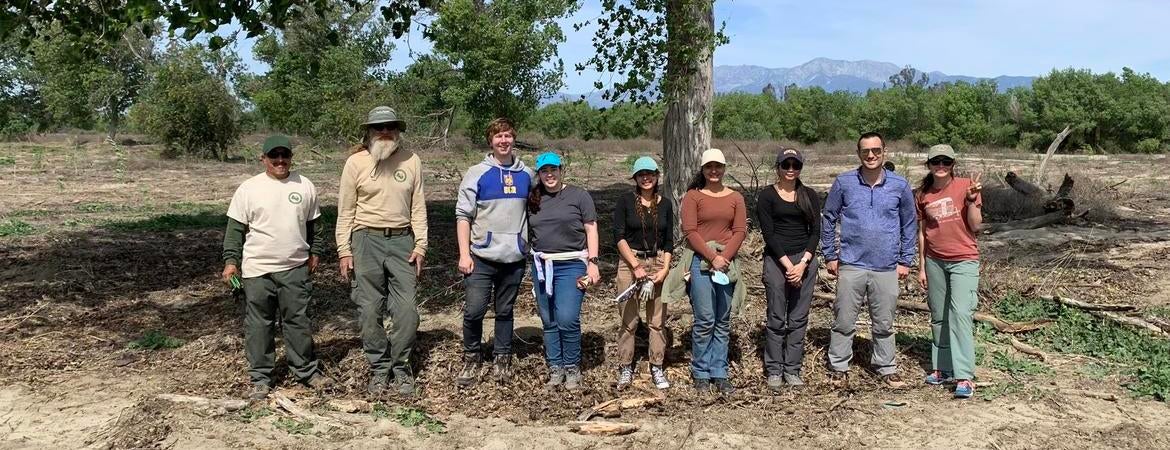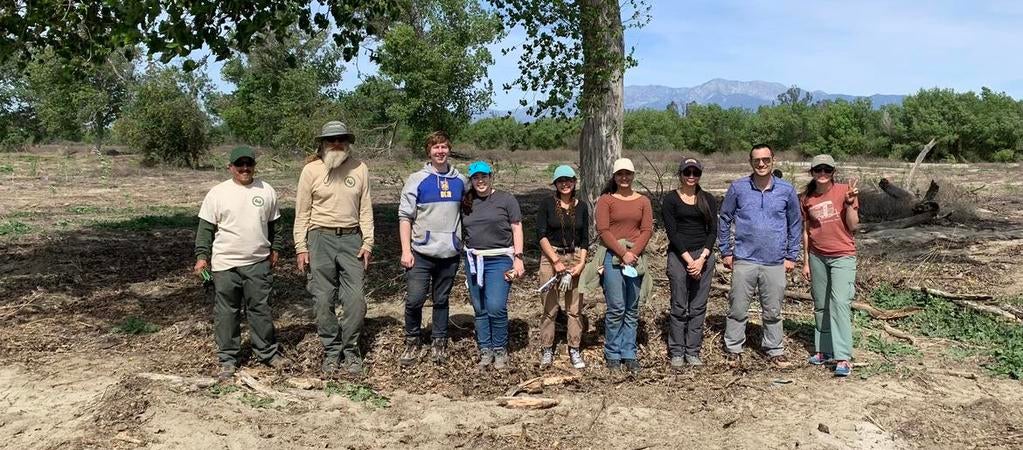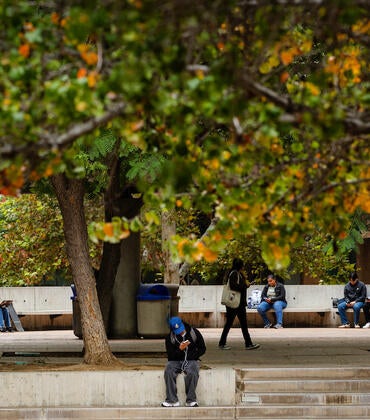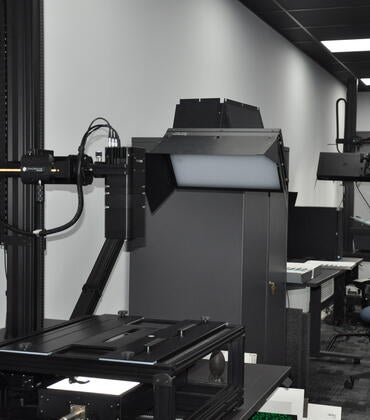Seven UC Riverside student volunteers from the College of Science and Natural Sciences, or CNAS, joined wildlife experts from the Riverside County Parks (or RivCoParks) in planting 240 native riparian trees at Hidden Valley Wildlife Area in Jurupa Valley, California.
The project was led by UCR’s Society for Ecological Restoration (or UCR-SER), a chapter of the longstanding, global international organization dedicated to advancing the science, practice, and policy of ecological restoration. UCR-SER was established last spring by graduate students conducting research on ecological restoration and other biological studies.
Stuart Schwab, a doctoral student and UCR-SER board member, reached out to the land manager in charge of stewarding the local parks and inquired about ongoing projects that they needed help with. Robert Williams of RivCoParks linked them up with a current initiative to plant 750 riparian trees.
During UCR’s spring break, from 8 a.m. until noon, volunteers from an ecological restoration class taught by Loralee Larios, assistant professor, and plant ecologist, used post holders to clear out soil for their young, rooted tree cuttings. RivCoParks provided the trees and equipment and chose the Jurupa Valley location, but SER provided the physical labor. The energetic Highlander volunteers worked hard as they chatted with the RivCoParks biologist and staff members about their organization and careers in the field. For a lot of these students, this was their first time meeting in person since the pandemic started.
“We were all really hurting the next day,” said Clarissa Rodriguez, a doctoral student and UCR-SER board member. “We were basically doing sumo squats every time we used the post holder to make room in the sandy soil for the tree cuttings.”
Today we planted 240 native riparian trees at the Hidden Valley Wildlife Area in Jurupa Valley, CA. Such a great way to spend a spring break morning! @SERestoration @UCRCNAS pic.twitter.com/ugg0qPxMOL
— SER- UCR (@UcrSer) March 22, 2022
Rodriguez and Schwab are both dedicated to restoring native plants in our area. But to do so, they must take on the “nasty” plants that compromise them.
Both are both writing their dissertations on the invasive Stinknet plant (Oncosiphon Pililuferum) and explained this noxious plant, and others like it, fall in the nasty category after being introduced to local habitat, spreading rapidly, invading the space of native plants, and taking resources away from them. Invasive species change the biodiversity — the second leading cause of biodiversity loss globally — harm local wildlife, interact with the soil, and sometimes reduce fungi, which native flowers need to flourish.
We are doing our part in helping reduce the spread of the invasive stinknet (Oncosiphon pililuferum). Thank you to those who came out to Lake Matthews Preserve to pull some weeds on a Saturday morning! pic.twitter.com/eY1FxF86T1
— SER- UCR (@UcrSer) April 14, 2022
In Riverside County, the Stinknet plant is making life difficult for the endangered Stephan’s Kangaroo Rat by taking over their habitat. It’s described as a sticky plant with a sour aroma that replaces native plant life, and it’s been adversely affecting Lake Perris since 2010.
Says Rodriguez, “In order to keep our beautiful biodiversity and restore these things, we need to get rid of the invasive species.”
But how? For the person who is concerned with restoring the environment but isn’t sure how to be effective, Rodriguez and Schwab offer simple but impactful tips that can help reestablish native plants.
Rodriguez says, “Get native plants at local nurseries, like UCR Botanic Gardens. Stores like Home Depot or Lowes aren’t as mindful of the non-native plants they’re introducing to our local ecosystem.”
Schwab says, “When hiking, brush off the bottom of your shoes before and after you walk a trail to prevent seed spread. This will help to keep seeds in their native areas and protect the nasty plants from entering their system.”
To learn about native plants that need love in your area during and after Earth Day/Month, visit calscape.org.
SER connects undergrads with careers in land management and gets them working in local parks. Anyone interested in volunteering for earth-conscious projects can follow UCR-SER on Twitter (@UCRSER) to stay informed about future events.





